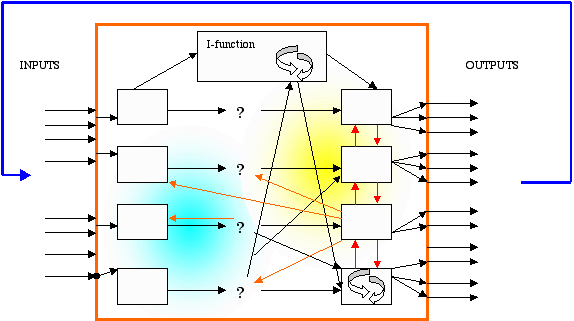With increased understanding of the brain?

| Course Home Page | Schedule | Faculty |
|
| The Miriam Model | The Shelley Model |
|---|---|
| neurons, chemicals, changes with experience | neurons,chemicals, changes with experience AND thoughts/mind |
| 7 | 2 |
| Are they the same thing (4)? With increased understanding of the brain?
|
|---|
| Thinking about mental health in terms of the brain Read, join, continue forum discussion on-line |
|---|
| cons | pros |
|---|---|
| propensity to "medical model" attitude
associated presumption of "illness" as distinct category associated assumption of perfectibility associated assumption of "patient" as object associated look for "quick fix" therapies |
a "neurobiological model" attitude?
accepts existence of innate influences, of continuous variation among individuals emphasizes importance as well of experience and of personal choice acknowledges that some kinds of changes take extended time at best, may not be achievable at worst incorporates cultural context dependence |
|
|
I have had many concerns about writing a book that so explicitly describes my own attacks of mania, depression, and psychosis, as well as my problems acknowledging the need for ongoing medication ... but one of the advantages of having had manic-depressive illness for more than thirty years is that very little seems insurmountably difficult.
Kay Refield Jamison, An Unquiet Mind, Vintage Books, 1995 Manic-depression is part of my life. I cannot deny that. It is encoded in my genes. But that doesn't mean it has to rule my life -- and I haven't let it. Ashley Plotnick |
Tourette's Syndrome
|
Autism
|
This is a story of two battles, a battle to keep out the "world" and a battle to join it. ... I have, throughout my private war, been a she, a you, a Donna, a me finally, an I. All of us will tell it like it was and like it is. If you sense distance, you're not mistaken; its real. Welcome to my world.
Donna Williams, Nobody Nowhere, Avon Books, 1992 |
|
| "But I still think about how to get high every day. And that's the part of my addiction that eats me alive". |
Brain=behavior as incentive for development of therapeutic practice?
| Mental Health on Serendip | Center for Science in Society | Serendip Home |